The OECS – from SIDS to Large Ocean States
Media Release
OECS Member States, typically categorised as Small Island Developing States (SIDS) have been urged to make a paradigm shift to large ocean states.
This challenge has come from Hon. Camillo Gonsalves – Minister of Finance, Economic Planning, Sustainable Development and Information Technology of St. Vincent and the Grenadines. Delivering the Keynote address to the Blue Economy Investors Roundtable on the opening day of the OECS Sustainable Development Movement (SDM 2020), Gonsalves told his virtual audience:
“The Sea that surrounds us and connects us, has the potential to catapult us to an entirely new development trajectory. OECS territories are roughly 90 to 99 percent ocean. We may be small island developing states, but we are also large ocean developing states. We are a lot bigger than we think we are. To ignore our vast seascape and its tremendous potential, is developmental malpractice. We must cast our eyes outward and recognise that the beach or the coastline, is not the edge of our world but the beginning of the immense untapped resource that can sustainably fuel our growth and development.”
Gonsalves says the OECS stands at a philosophical and developmental crossroads. In his words:
“We can continue our insular inward gaze, hoping that the answers to our challenges lie solely within the confines of our individual terrestrial space or we can look behind our shoreline and develop plans for the sustainable use of our large ocean resources that are focused on economic growth and diversification, environmentally responsible local management, and accelerated people-centred development. We must reconceptualise ourselves as ocean states, with control over a territory almost 100 times larger than our land space, with all the attendant rights, responsibilities, and influence, that such realignment implies.”
Gonsalves stressed that embracing the potential of the Blue Economy in the OECS necessitates the realignment of governance structures and reallocation of scarce resources. He acknowledged that such realignments are challenging in the best of times, and doubly difficult against the backdrop of the devastating economic impacts of the COVID-19 pandemic.
Speaking to the UN Sustainable Development Goals – SDG 2030, Gonsalves said with a 10-year window of opportunity remaining to capitalise on the international focus and support engendered by the SDGs, the OECS must define and prioritise a common vision of how the Blue Economy can drive regional development. He adds that within the context of the global pursuit of the Sustainable Development Goals, a clear declaration of intent and a coherent plan of action by the OECS would likely garner targeted cooperation, knowledge transfer, and support.
Minister Gonsalves, who recently authored the book – Globalized, Climatized, Stigmatized – cautioned against the proliferation of foreign entities in Blue Economy investments in the region. He believes that island states must retain a great degree of control of their marine resources and ocean space, even when partnering with responsible private enterprise. In his words, the global tale of Blue Economy investment in small islands has been one of unequal bargaining positions and grossly inequitable distribution of returns from the use of the islands' seascape. He says while no one expects private sector investors to be altruistic, their advantages of capital, equipment and specialised expertise give them a negotiating advantage that all but guarantees an exploitative relationship with the marine environment of small states.
OECS Director General Dr. Didacus Jules told the virtual forum:
“The Sea is finally coming to prominence as an unexplored and insufficiently claimed patrimony. This Blue Economy Investors Roundtable provides insight into the potential of our ocean space, it maps the untapped possibilities of our vast ocean space, and it furthers the possibilities of the SDM in making that ‘mind shift’ from seeing ourselves as small island states to embracing our reality as large ocean states.”
The Director General noted that the process of realising our potential as ocean states began as far back as 2013, when the OECS Heads of Government endorsed the Eastern Caribbean Regional Ocean Policy (ECROP) and its Strategic Action Plan. He said the modest objective then, was to encourage collaborative and integrated governance frameworks to address marine user conflicts and protect the fragile marine environment. ECROP was updated in 2020, to align with the 2030 Agenda for Sustainable Development Goals – SDG 2030. In October of 2017, the OECS signed a grant agreement with the World Bank for the Caribbean Regional Oceanscape Project (CROP), designed to fast track the implementation of the ECROP.
The OECS Director General added:
“An integrated structure of initiatives ranging from strengthening capacity for ocean governance to coastal and marine spatial planning, will establish a solid foundation for our effective stewardship of this patrimony. We want to thank the World Bank, and specifically, Regional Director – Tahseen Sayed and her team, for the confidence placed in the OECS Commission in prototyping this innovative approach to oceans development in our region.”
Like Minister Gonsalves, Dr. Jules underscored that a fundamental principle of Blue Economy investments in the OECS is inclusion and equity, ensuring that as we move to undertake sustainable utilisation of the resources and wealth of the ocean, traditional resource users and coastal communities are positioned to participate and benefit from this wealth.
Dr. Jules lauded the work of “the extraordinarily competent and cohesive team of the OECS Environmental Sustainability Cluster led by Chamberlain Emmanuel, who have executed this work with such deep commitment and imagination.”
The Blue Economy investment opportunities unveiled at the virtual Blue Economy Investors Roundtable on the Opening Day of OECS SDM 2020 include aquaculture, mariculture, fisheries, renewable energy exploration, waterfront development, fishing village resorts, coastal replanting, and beach nourishment.
The virtual Blue Economy Investors forum was attended by several international development partners including the Government of Norway, the World Bank, the European Union, the Commonwealth Secretariat, the Government of Canada, the Caribbean Development Bank, the European Investment Bank, and the Inter-American Development Bank. These development partners disclosed available funding for existing and new Blue Economy initiatives and investments under various programmes and projects, some of which are already being implemented.
About the Sustainable Development Movement:
The OECS Sustainable Development Movement (SDM) Summit is a two-day event expected to attract over 3000 delegates from across the Caribbean Region and internationally to meet virtually and exchange thoughts, best practices, untold stories and strategies concerning sustainable growth and development on September 22-24, 2020.
About the Organisation of Eastern Caribbean States:
The Organisation of Eastern Caribbean States (OECS) is an international organisation dedicated to economic harmonisation and integration, protection of human and legal rights, and the encouragement of good governance among independent and non-independent countries in the Eastern Caribbean comprising Antigua and Barbuda, Commonwealth of Dominica, Grenada, Montserrat, St. Kitts and Nevis, Saint Lucia, St. Vincent and the Grenadines, British Virgin Islands, Anguilla, Martinique and Guadeloupe.
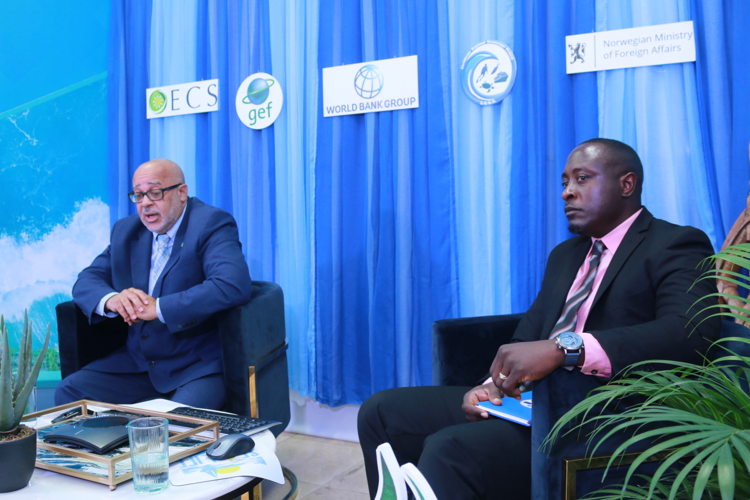 Director General of the OECS, Dr. Didacus Jules; and Head of the OECS Environmental Sustainability Cluster, Mr. Chamberlain Emmanuel, address the virtual audience at the Blue Economy Investors Roundtable - Official Side Event of the OECS Sustainable Development Movement (SDM 2020).
Director General of the OECS, Dr. Didacus Jules; and Head of the OECS Environmental Sustainability Cluster, Mr. Chamberlain Emmanuel, address the virtual audience at the Blue Economy Investors Roundtable - Official Side Event of the OECS Sustainable Development Movement (SDM 2020).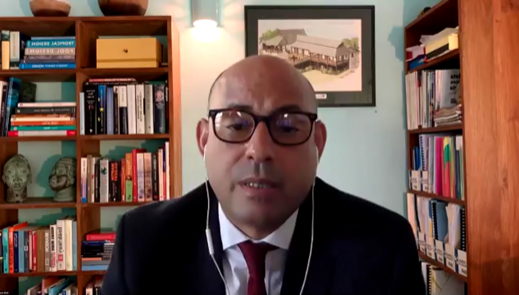 Hon. Simon Stiell, Minister for Climate Resilience, The Environment, Forestry, Fisheries and Disaster Management for Grenada, moderates the Blue Economy Investors Roundtable - Official Side Event of the OECS Sustainable Development Movement (SDM 2020).
Hon. Simon Stiell, Minister for Climate Resilience, The Environment, Forestry, Fisheries and Disaster Management for Grenada, moderates the Blue Economy Investors Roundtable - Official Side Event of the OECS Sustainable Development Movement (SDM 2020).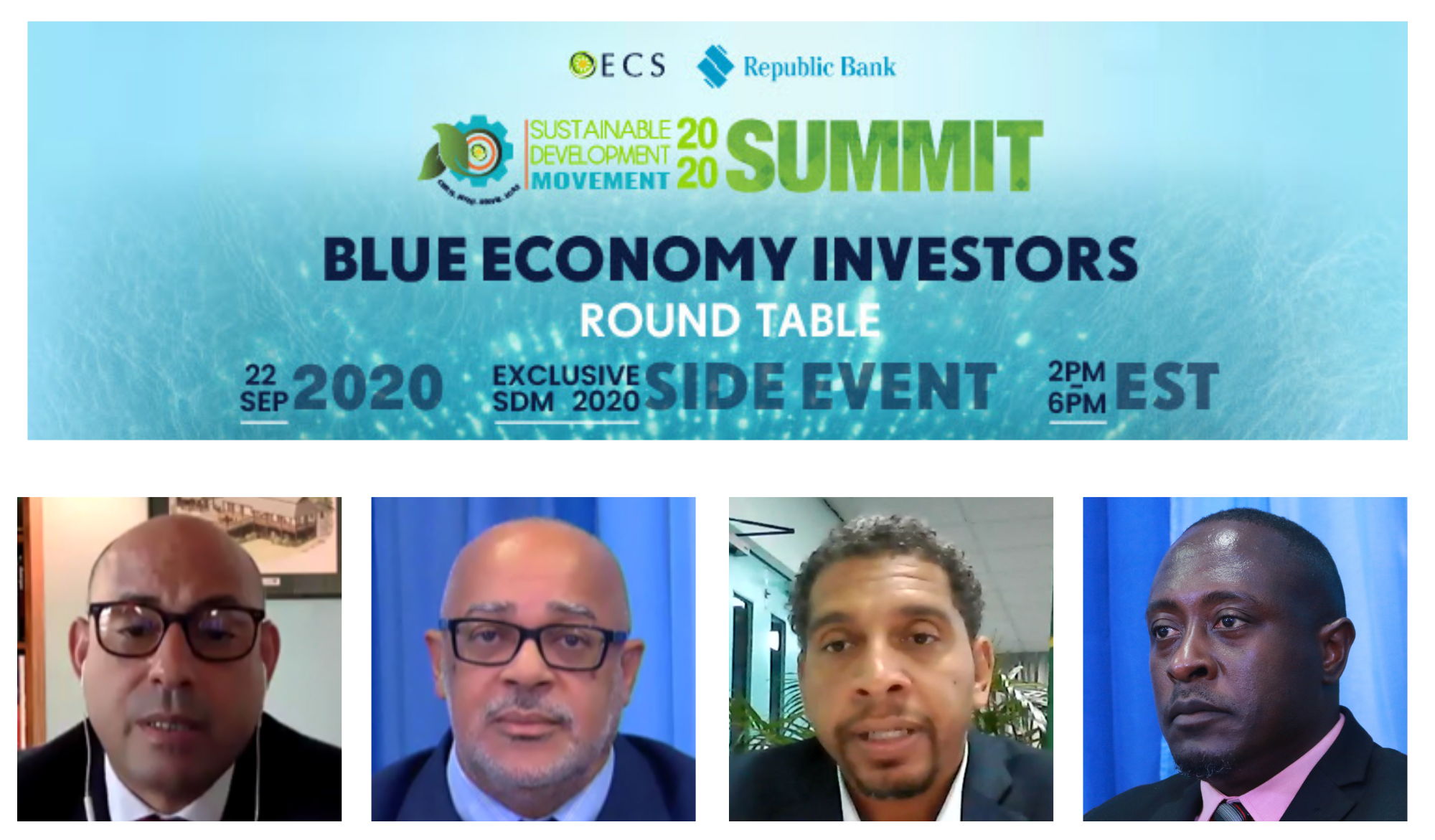.png)
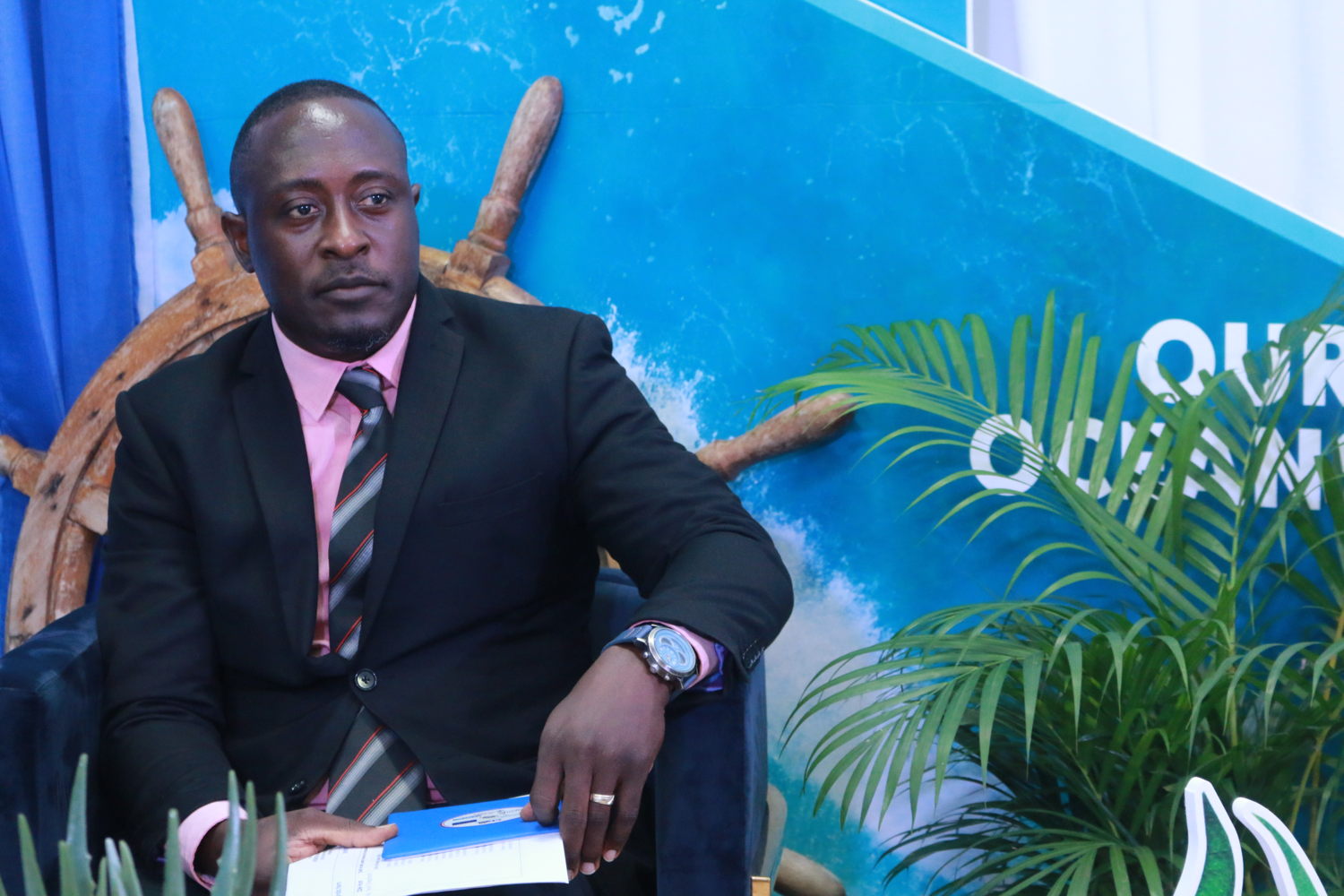
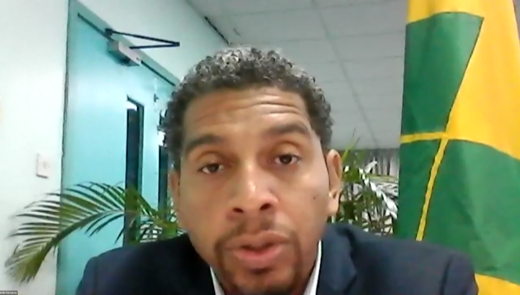
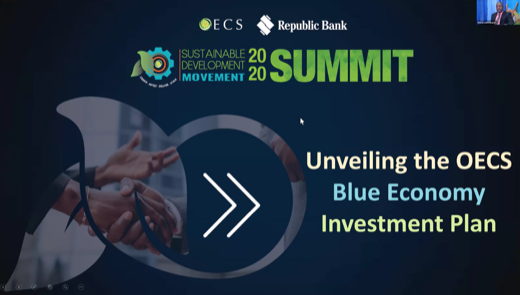
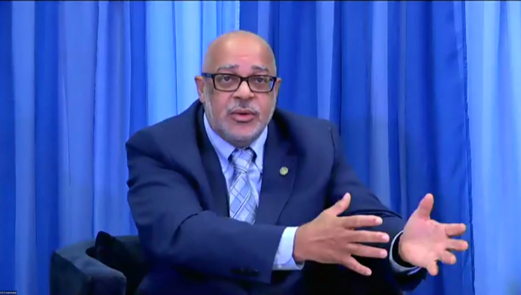
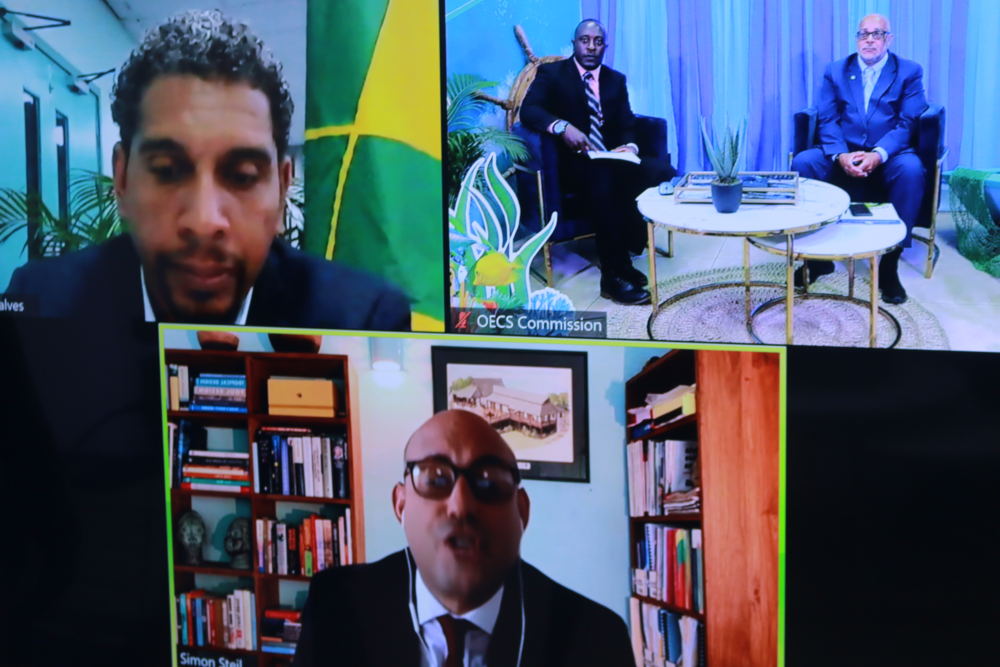
.jpg)